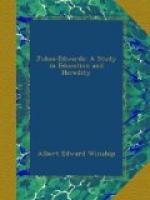When Jonathan Edwards, a lad of twelve, entered college, there had been, all told, only about fifty graduates. It was during the time that he was a student that the college took the name of Yale. The first year he was there the college was in three places at the same time because of dissensions among the students, and the very small class graduated in two places because neither faction would go to the other place. In all these agitations Mr. Edwards took no part. He simply devoted himself to his studies and followed the line of least resistance so far as taking sides in a senseless controversy was concerned. After graduation he remained at Yale two years for post-graduate work, mostly in theology, and then accepted an invitation to preach for the leading Presbyterian church in New York City; but after eight months he returned to Yale as a tutor and remained two years.
At this time he was very severe in discipline, bending every energy to securing the right conditions for the most and best work. This is what he wrote in his diary when he was twenty-one:
“By a sparingness in diet, and eating, as much as may be, what is light and easy of digestion, I shall doubtless be able to think more clearly, and shall gain time:
1. By lengthening out my life.
2. Shall need less time for digestion after meals.
3. Shall be able to study more closely, without injury to my health.
4. Shall need less time for sleep.
5. Shall more seldom be troubled with the headache.”
Mr. Edwards was twenty-three years of age when he was ordained at Northampton as associate pastor with his grandfather Stoddard, then in his 84th year, and the 54th year of his pastorate. Soon after this Mr. Stoddard died and Mr. Edwards became pastor in full charge and remained for twenty-five years. He was a great student and thinker. He rose at four o’clock and spent thirteen hours a day in his study. It is worth while to follow the personal intellectual habits of the man whose descendants we are to study. When he was ready for the consideration of a great subject he would set apart a week for it and mounting his horse early Monday morning would start off for the hills and forests. When he had thought himself up to a satisfactory intensity he would alight, fasten his horse, go off into the




